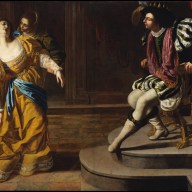By JERRY TALLMER
In the offices of Photoplay magazine in Hollywood in 1923, a staff writer named Adela Rogers St. John is reading aloud from a puff piece by a colleague named Herbert Howe about the movie actor Ramon Novarro who is soon to star in “Ben-Hur.”
“There are personalities in terms of color,” Howe has written, “others in terms of earth and power; the ultimate translation of Novarro is in terms of light. A brilliance in black and white, his eyes so mesmerize a mood that you forget to listen.”
St. John lets go of Howe’s dispatch. “Christ,” she says, “the world hasn’t seen stuff like this since Robert Browning met Elizabeth.”
Indeed, within the four walls (one invisible) of the Wings Theater on Christopher Street, the tough-minded, cynical, fast-talking, veteran Hollywood journalist Herbert Howe will be propelled into a love affair with screen idol Novarro no less ardent and probably a good bit more carnal than that of Robert and Elizabeth Barrett Browning.
The play, written by George Barthel, directed by L.J. Kleeman and Richard Bacon, is “Through a Naked Lens,” and it moves along quite like something out of Photoplay as well as something out of a movie.
“It’s a film come to life,” says co-director Kleeman. “Doesn’t fit the rules of Playwriting 101, a single set and all that,” says author Barthel, a graduate — as is Laura Kleeman — of NYU’s Tisch School of the Arts. He and she have been close collaborators ever since they did “Naked Enemy” together at Wings some 10 years ago, a drama about a gay British spy who, sent to France to report by radio during World War II, falls in love with a German army officer.
Many millions of Americans in the 1920s, particularly (but not exclusively) female Americans, swooned before the eyes and visage and tenderness of Ramon Novarro, just as they swooned before the penetrating eyes and brooding visage of the four-years-older Rudolph Valentino.
“Through a Naked Lens” brings back various other real people — Hollywood directors Fred Niblo (bad guy) and Rex Ingram (good guy), sympathetic actress Alice Terry (Mrs. Ingram), MGM studio tyrant Louis B. Mayer, his “boy wonder” second-in-command, Irving Thalberg, Photoplay editor James Quirk, writer Adela Rogers St. John, and the no less real Herbert Howe, whose series of Photoplay articles, “On the Road With Ramon,” gave this play its germinating spark.
It was while researching the sensational 1921 Hollywood murder of director William Desmond Taylor that playwright Barthel first came upon Howe’s byline in Photoplay.
“I wrote a play called ‘Murder in Hollywood,’ but was not happy with it and it was never done,” says Barthel. “Tangentially, reading about Taylor, who may have been gay, I began reading Howe on Novarro, and then good biographies of Howe by Andre Soares and Allan K. Ellenberger, and then three biographies of Valentino, and so on.
“The obsessive quality of Howe’s stuff on Novarro seeps through every bit of it. There’s no question in my mind that they were lovers. At first they were not too impressed with one another, but after Photoplay sent Howe to Tunis to cover Novarro in 1923, the two became — as the books call it — ‘inseparable.’ ”
Director Kleeman and playwright Barthel are somewhat inseparable themselves, though more is known about her than him. “Just say I’ve been writing since age 3,” says Barthel. Ms. Kleeman, born in Queens — her father a photographic lithographer, her mother a secretary — still lives in that borough, sharing digs with stage manager Paris LeBron. Barthel may be seen entering and leaving at certain hours.
At NYU, aspiring writer Kleeman “bitterly resented” having to learn about directing — learn by doing it. Now she not only directs but for this production she is also the costume designer. “A recent development,” she says. Some development: 67 different costumes!
The cast is headed by JoHary Ramos as Ramon Novarro, Stephen Smith as Herbert Howe, Raymond O. Wagner as Louis B. Mayer, Laura Beth Wells as Adela Rogers St. John, and Richard Bacon as Rex Ingram.
In support are Shay Coleman, Heather Murdock, Joe Pepe, Sheila Shaigany — and Tracy Gaillard as the ambitious young go-getting gossip snoop (an imaginary character also named Tracy) who digs out and spills the beans on the whole hush-hush Novarro/Howe romance.
If the murder of William Desmond Taylor lies at one end of the Ramon Novarro story, the murder of Novarro himself by two young hustlers in his North Hollywood home, on October 30, 1968, lies at the other.
That’s not in the play. Why not? “Well, this is a love story, not a biography,” says George Barthel, and who can argue? “Adios, Ramon! Vaya con Dios!”
google_ad_client = “pub-6226499064891091”;
google_ad_width = 468;
google_ad_height = 60;
google_ad_format = “468x60_as”;
google_ad_channel =”0606561524″;
google_color_border = “336699”;
google_color_bg = “FFFFFF”;
google_color_link = “0000FF”;
google_color_url = “008000”;
google_color_text = “000000”;
//–>
src=”https://pagead2.googlesyndication.com/pagead/show_ads.js”>
WWW Downtown Express


































